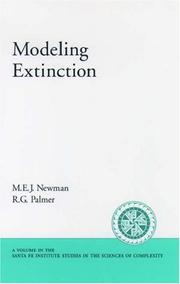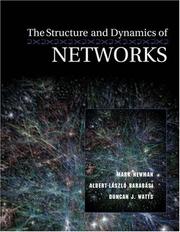| Listing 1 - 7 of 7 |
Sort by
|
Book
ISBN: 9780199206650 0199206651 Year: 2015 Publisher: Oxford Oxford University Press
Abstract | Keywords | Export | Availability | Bookmark
 Loading...
Loading...Choose an application
- Reference Manager
- EndNote
- RefWorks (Direct export to RefWorks)
"The scientific study of networks, including computer networks, social networks, and biological networks, has received an enormous amount of interest in the last few years. The rise of the Internet and the wide availability of inexpensive computers have made it possible to gather and analyze network data on a large scale, and the development of a variety of new theoretical tools has allowed us to extract new knowledge from many different kinds of networks. The study of networks is broadly interdisciplinary and important developments have occurred in many fields, including mathematics, physics, computer and information sciences, biology, and the social sciences. This book brings together for the first time the most important breakthroughs in each of these fields and presents them in a coherent fashion, highlighting the strong interconnections between work in different areas. Subjects covered include the measurement and structure of networks in many branches of science, methods for analyzing network data, including methods developed in physics, statistics, and sociology, the fundamentals of graph theory, computer algorithms, and spectral methods, mathematical models of networks, including random graph models and generative models, and theories of dynamical processes taking place on networks"--
System Analysis --- Network analysis (planning) --- Systems biology --- Engineering systems --- Social systems --- Engineering systems. --- Network analysis (Planning). --- Social systems. --- System analysis. --- Systems biology. --- Computernetwerken. --- Netwerken. --- Sociale netwerken. --- Network analysis (Planning) --- System analysis --- Computational biology --- Bioinformatics --- Biological systems --- Molecular biology --- Network theory --- Systems analysis --- System theory --- Mathematical optimization --- Sociology --- Project networks --- Planning --- Engineering --- Network analysis --- Network science --- Statistical physics --- Computer. Automation
Book
ISBN: 9780191843235 Year: 2018 Publisher: Oxford Oxford University Press
Abstract | Keywords | Export | Availability | Bookmark
 Loading...
Loading...Choose an application
- Reference Manager
- EndNote
- RefWorks (Direct export to RefWorks)

ISBN: 0198517971 0198517963 Year: 1999 Publisher: Oxford Clarendon
Abstract | Keywords | Export | Availability | Bookmark
 Loading...
Loading...Choose an application
- Reference Manager
- EndNote
- RefWorks (Direct export to RefWorks)
536.75 --- 519.245 --- 681.3*I6 --- 681.3*J2 --- 681.3*J2 Physical sciences and engineering (Computer applications) --- Physical sciences and engineering (Computer applications) --- 519.245 Stochastic approximation. Monte Carlo methods --- Stochastic approximation. Monte Carlo methods --- 536.75 Entropy. Statistical thermodynamics. Irreversible processes --- Entropy. Statistical thermodynamics. Irreversible processes --- 681.3*I6 Simulation and modeling (Computing methodologies)--See also {681.3*G3} --- Simulation and modeling (Computing methodologies)--See also {681.3*G3} --- Statistical physics --- Mathematical physics --- Probability theory --- Monte Carlo method. --- Statistical physics. --- Monte-Carlo, Méthode de --- Physique statistique --- Monte Carlo method --- Physics --- Mathematical statistics --- Artificial sampling --- Model sampling --- Monte Carlo simulation --- Monte Carlo simulation method --- Stochastic sampling --- Games of chance (Mathematics) --- Mathematical models --- Numerical analysis --- Numerical calculations --- Stochastic processes --- Statistical methods

ISBN: 0191589861 1280375205 9786610375202 0585484007 9780585484006 0198517963 0198517971 Year: 1999 Publisher: Oxford New York Clarendon Press Oxford University Press
Abstract | Keywords | Export | Availability | Bookmark
 Loading...
Loading...Choose an application
- Reference Manager
- EndNote
- RefWorks (Direct export to RefWorks)
This book provides an introduction to Monte Carlo simulations in classical statistical physics and is aimed both at students beginning work in the field and at more experienced researchers who wish to learn more about Monte Carlo methods. The material covered includes methods for both equilibrium and out of equilibrium systems, and common algorithms like the Metropolis and heat-bath algorithms are discussed in detail, as well as more sophisticated ones such as continuous time Monte Carlo, cluster algorithms, multigrid methods, entropic sampling and simulated tempering. Data analysis techniques are also explained starting with straightforward measurement and error-estimation techniques and progressing to topics, such as the single and multiple histogram methods and finite size scaling. The last few chapters of the book are devoted to implementation issues, including discussions of such topics as lattice representations, efficient implementation of data structures, multispin coding, parallelization of Monte Carlo algorithms, and random number generation.; At the end of the book, the authors give a number of example programmes demonstrating the applications of these techniques to a variety of well-known models.
Monte Carlo method. --- Statistical physics. --- Physics --- Mathematical statistics --- Artificial sampling --- Model sampling --- Monte Carlo simulation --- Monte Carlo simulation method --- Stochastic sampling --- Games of chance (Mathematics) --- Mathematical models --- Numerical analysis --- Numerical calculations --- Stochastic processes --- Statistical methods

ISBN: 0197562000 9786610704033 1280704039 0198036140 9780198036142 9780195159455 0195159454 9780195159462 0195159462 0195159454 0195159462 9780197562000 Year: 2003 Publisher: Oxford ; New York : Oxford University Press,
Abstract | Keywords | Export | Availability | Bookmark
 Loading...
Loading...Choose an application
- Reference Manager
- EndNote
- RefWorks (Direct export to RefWorks)
Developed after a meeting at the Santa Fe Institute on extinction modeling, this text comments critically on the various modeling approaches. In the last decade or so, scientists have started to examine a new approach to the patterns of evolution and extinction in the fossil record. This approach may be called 'statistical paleontology,' since it looks at large-scale patterns in the record and attempts to understand and model their average statistical features, rather than their detailed structure. Examples of the patterns these studies examine are the distribution of the sizes of mass extinction events over time, the distribution of species lifetimes, or the apparent increase in the number of species alive over the last half a billion years.
Extinction (Biology) --- Animals --- Extirpation (Biology) --- Biology --- Extinct animals --- Statistical methods. --- Mathematical models. --- Extinction --- Extirpation --- Statistical methods --- Mathematical models --- Extinction (Biology) - Statistical methods --- Extinction (Biology) - Mathematical models
Book
ISBN: 9780198517979 Year: 2010 Publisher: Oxford Clarendon Press
Abstract | Keywords | Export | Availability | Bookmark
 Loading...
Loading...Choose an application
- Reference Manager
- EndNote
- RefWorks (Direct export to RefWorks)
Probability theory --- Mathematical physics --- Statistical physics

ISBN: 9780691113562 0691113564 9780691113579 0691113572 Year: 2006 Publisher: Princeton : Princeton University Press,
Abstract | Keywords | Export | Availability | Bookmark
 Loading...
Loading...Choose an application
- Reference Manager
- EndNote
- RefWorks (Direct export to RefWorks)
From the Internet to networks of friendship, disease transmission, and even terrorism, the concept - and the reality - of networks has come to pervade modern society. But what exactly is a network ? What different types of networks are there ? Why are they interesting, and what can they tell us ? In recent years, scientists from a range of fields - including mathematics, physics, computer science, sociology, and biology - have been pursuing these questions and building a new 'science of networks.' This book brings together, for the first time, a set of seminal articles representing research from across these disciplines. It is an ideal sourcebook for the key research in this fast-growing field. The book is organized into four sections, each preceded by an editors' introduction summarizing its contents and general theme. The first section sets the stage by discussing some of the historical antecedents of contemporary research in the area. From there the book moves to the empirical side of the science of networks before turning to the foundational modeling ideas that have been the focus of much subsequent activity.The book closes by taking the reader to the cutting edge of network science - the relationship between network structure and system dynamics. From network robustness to the spread of disease, this section offers a potpourri of topics on this rapidly expanding frontier of the new science.
Computer networks --- Dynamics --- Social networks --- Complexity (Philosophy) --- Complexity (Philosophy). --- Computer networks. --- Dynamics. --- Social networks. --- Dynamique. --- Réseaux d'ordinateurs. --- Réseaux sociaux. --- Sociology of organization --- Science --- Dynamique --- Réseaux sociaux --- Réseaux d'ordinateurs --- Complexité (Philosophie) --- 519.1 --- gedrag --- Internet --- psychologie, sociaal --- sociologie --- 519.876.3 --- 519.876.3 Network planning --- Network planning --- Networking, Social --- Networks, Social --- Social networking --- Social support systems --- Support systems, Social --- Interpersonal relations --- Cliques (Sociology) --- Microblogs --- Dynamical systems --- Kinetics --- Mathematics --- Mechanics, Analytic --- Force and energy --- Mechanics --- Physics --- Statics --- Communication systems, Computer --- Computer communication systems --- Data networks, Computer --- ECNs (Electronic communication networks) --- Electronic communication networks --- Networks, Computer --- Teleprocessing networks --- Data transmission systems --- Digital communications --- Electronic systems --- Information networks --- Telecommunication --- Cyberinfrastructure --- Electronic data processing --- Network computers --- Philosophy --- Emergence (Philosophy) --- Distributed processing --- Acqui 2006
| Listing 1 - 7 of 7 |
Sort by
|

 Search
Search Feedback
Feedback About UniCat
About UniCat  Help
Help News
News